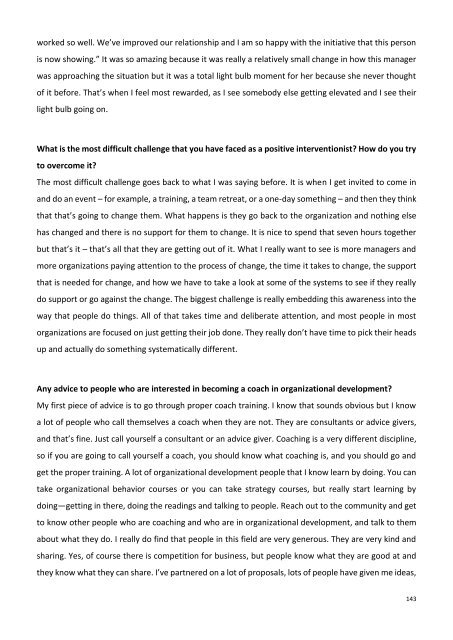Dedications
Positive%20Psychologists%20on%20Positive%20Psychology%203rd%20Vol
Positive%20Psychologists%20on%20Positive%20Psychology%203rd%20Vol
You also want an ePaper? Increase the reach of your titles
YUMPU automatically turns print PDFs into web optimized ePapers that Google loves.
worked so well. We’ve improved our relationship and I am so happy with the initiative that this person<br />
is now showing.” It was so amazing because it was really a relatively small change in how this manager<br />
was approaching the situation but it was a total light bulb moment for her because she never thought<br />
of it before. That’s when I feel most rewarded, as I see somebody else getting elevated and I see their<br />
light bulb going on.<br />
What is the most difficult challenge that you have faced as a positive interventionist? How do you try<br />
to overcome it?<br />
The most difficult challenge goes back to what I was saying before. It is when I get invited to come in<br />
and do an event – for example, a training, a team retreat, or a one-day something – and then they think<br />
that that’s going to change them. What happens is they go back to the organization and nothing else<br />
has changed and there is no support for them to change. It is nice to spend that seven hours together<br />
but that’s it – that’s all that they are getting out of it. What I really want to see is more managers and<br />
more organizations paying attention to the process of change, the time it takes to change, the support<br />
that is needed for change, and how we have to take a look at some of the systems to see if they really<br />
do support or go against the change. The biggest challenge is really embedding this awareness into the<br />
way that people do things. All of that takes time and deliberate attention, and most people in most<br />
organizations are focused on just getting their job done. They really don’t have time to pick their heads<br />
up and actually do something systematically different.<br />
Any advice to people who are interested in becoming a coach in organizational development?<br />
My first piece of advice is to go through proper coach training. I know that sounds obvious but I know<br />
a lot of people who call themselves a coach when they are not. They are consultants or advice givers,<br />
and that’s fine. Just call yourself a consultant or an advice giver. Coaching is a very different discipline,<br />
so if you are going to call yourself a coach, you should know what coaching is, and you should go and<br />
get the proper training. A lot of organizational development people that I know learn by doing. You can<br />
take organizational behavior courses or you can take strategy courses, but really start learning by<br />
doing—getting in there, doing the readings and talking to people. Reach out to the community and get<br />
to know other people who are coaching and who are in organizational development, and talk to them<br />
about what they do. I really do find that people in this field are very generous. They are very kind and<br />
sharing. Yes, of course there is competition for business, but people know what they are good at and<br />
they know what they can share. I’ve partnered on a lot of proposals, lots of people have given me ideas,<br />
143



